6 Tips to Get the Most Out of Your Annual Review
Want to feel empowered at your next annual performance review?
You likely dread your annual review meeting. Many of us don't like talking about our strengths and accomplishments, much less addressing our challenges and weaknesses. But preparation is key—the more you dread something, the more you should prepare.
Our EPI coaches give their top 6 tips to maximize your annual review and have a productive conversation.
1. Start with gratitude.
You might be surprised at this tip, but we at EPI truly believe in the science of gratitude.
Researchers define gratitude as more than just appreciation. This means acknowledging that “the positive things in our lives—like a success at work—are often due to forces outside of ourselves, particularly the efforts of other people.”
Feelings of gratefulness activate the brain region associated with the neurotransmitter dopamine, which is directly linked to motivation. Dopamine increases the likelihood of action, reinforcing the behavior that sparked appreciation in the first place.
Ahead of your review, create a list for yourself of what you are grateful for in your job—projects that have helped improve skills, your teammates, opportunities for growth, etc. By focusing first on gratitude, you will gain the peace and confidence to build an agenda to get the feedback, support, and information you need for your development.
2. Know your accomplishments.
Don’t assume your manager will remember each of your achievements or recall all that you take care of on a day-to-day basis. Your annual review is a perfect time to remind your manager of your accomplishments and responsibilities.
Identify 3-4 of your most significant accomplishments for the year and provide supporting details for each one.
(Note: Keep an ongoing list of your successes throughout the year. Sometimes referred to as a “brag file,” this will significantly reduce the preparation time for your annual review. Don’t have one this year? Review your calendar for important meetings or look back at task-oriented notes to help jog your memory.)
3. Identify strengths and areas to develop.
We all have something we can improve for personal and professional development. This is your opportunity to ask about specific skills and qualities you could work on—communication, time management, organization, attitude, engagement, enthusiasm, etc. Proactively ask for this candid information so you can continue to develop.
On the other hand, you also want to understand what went well so you can build on your strengths. Ask what your manager values in you and discuss where else your strengths could be utilized.
4. Integrate prior feedback and lessons learned.
This is a positive process where you can incorporate growth and learning into next year’s goals. It’s valuable to show you’re taking proactive steps to integrate previous feedback and lessons learned. Your ability to do this proves commitment and encourages a growth mindset.
In addition, while it’s unlikely that every project went as planned, don’t blame others; it looks bad and it also removes the focus from you. After all, this is your year-end review. Instead, explain how you could have handled the situation differently or identify challenges in the system, along with ideas for solutions.
5. Connect back to the company’s greater goals.
You want to convey that you’re a valuable, contributing member of the team and an asset to the company.
How does your job impact the bottom line? How do your achievements fulfill a company objective? How do you drive revenue? Have you brought on new clients? Have you hit your sales targets? If your role is removed from more revenue-focused company goals, concentrate on how you and your role contribute to a better, more efficient, and productive team.
Need a refresher on the greater company goals? This is a good chance to ask your manager what the company’s current priorities are and if there are any upcoming changes. Then connect your goals to the highest priorities.
6. Discuss career next steps.
Your annual review is a great opportunity to discuss your overall career plans. Where do you see yourself in 1, 5, or 10 years?
Is there a skill you want to learn or training you’d like to receive? When you want to grow in a new direction, find a way to link it to how it can directly benefit the company—does it fill a gap, create a new revenue stream, or add value? Making a business case for the opportunity you want will increase the likelihood of the organization’s investment in your development.
Being able to describe your personal vision for your career will show you are dedicated, ambitious, and that you desire growth.
Never forget that you are your strongest career advocate!
Don’t just go through the motions of your year-end review; plan and prepare so you get the support you need for your personal and professional development and long-term career success.

